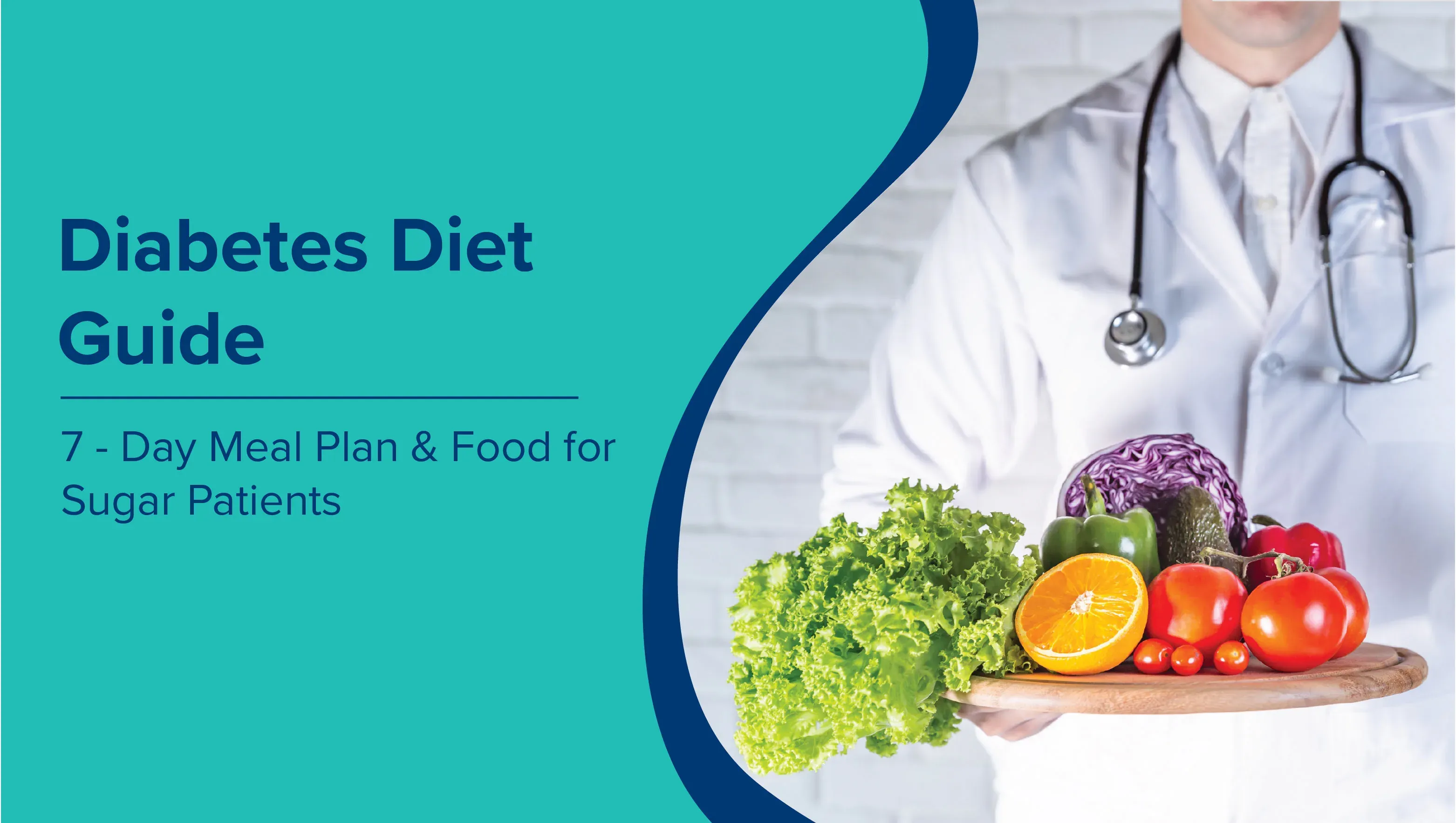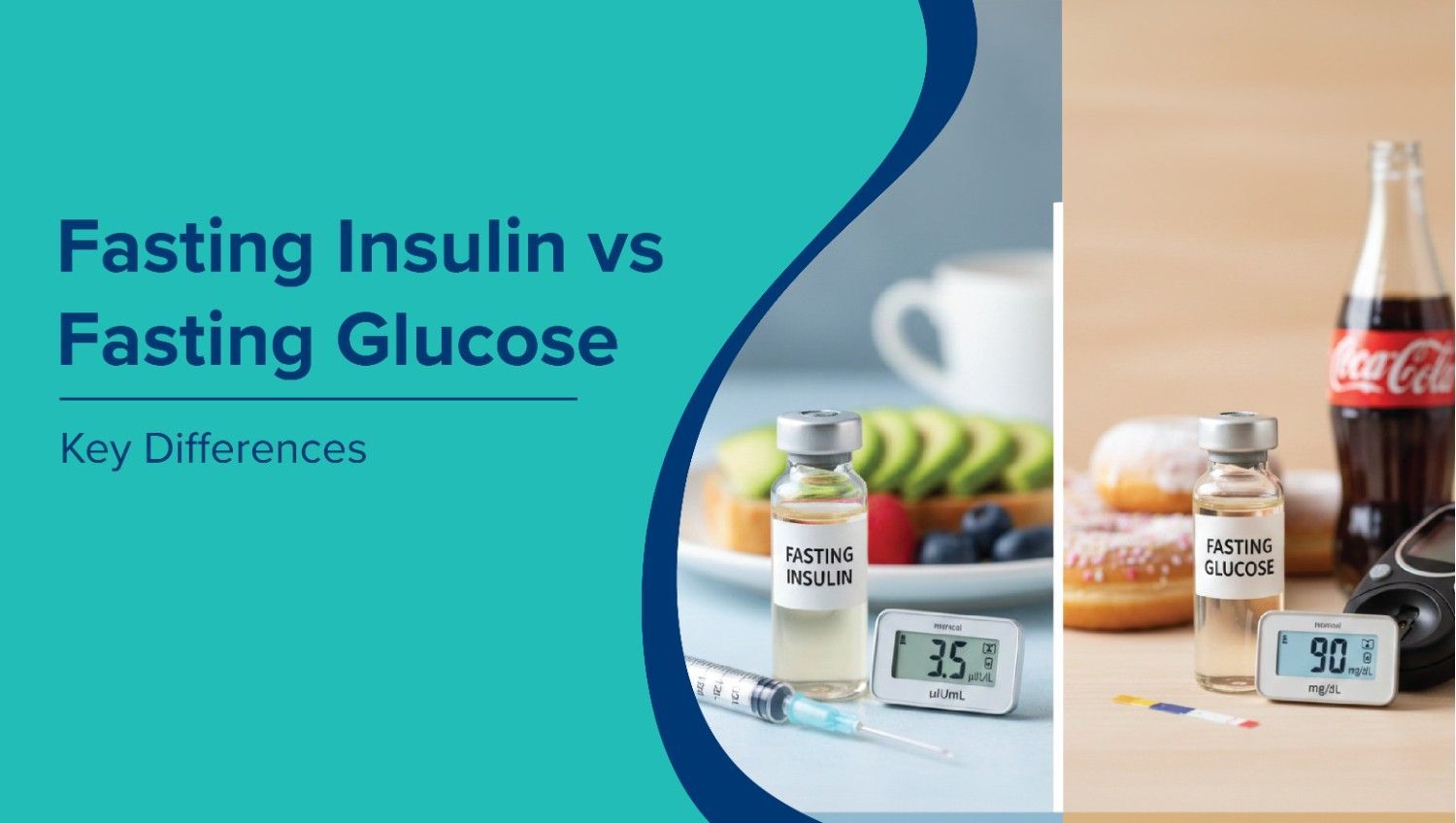Diet plays a central role in managing diabetes. The right food choices can help regulate blood sugar levels, boost energy, and lower the risk of related health issues. For those living with diabetes, following a structured meal plan makes daily management easier and more predictable. A weekly diet chart tailored to diabetic patients’ needs helps ensure the person receives a healthy balance of nutrients, and supports sugar control throughout the day. In this blog, we have shared a practical 7-day diet plan for diabetic patients, a complete food list, and some tips to help maintain a stable blood glucose level through everyday meals and snacks. But first, let’s understand the basics.
How Diet Affects Blood Sugar in Diabetics
The overall diet pattern plays a key role in managing blood sugar levels. What, when, and how much a person eats can significantly influence glucose control. Carbohydrates are broken down into glucose and raise blood sugar faster than protein or fat. However, not all carbs are the same, for example, complex carbohydrates with fibre are digested slowly and lead to a more gradual rise.
Other dietary factors that impact blood sugar include:
- Protein and healthy fats, which slow digestion and provide steady energy
- Fibre, which helps reduce the absorption of glucose
- Glycaemic Index (GI), a measure of how quickly foods raise blood sugar
- Meal timing, since irregular eating or long gaps can lead to sugar spikes or drops
Understanding these elements helps individuals with diabetes plan their meals more effectively and maintain stable blood sugar levels throughout the day.
Diabetic Diet Chart: Key Components
A balanced diabetic diet includes a mix of nutrients that help control blood sugar while supporting overall health. Rather than avoiding entire food groups, the focus should be on choosing the right types of foods in appropriate portions. The key components of a well-rounded diet for diabetes management include:
- Whole grains such as oats, barley, and millets, which release glucose slowly
- Lean protein sources like dal, tofu, eggs, fish, and grilled chicken
- Fibre-rich vegetables including spinach, bitter gourd, bottle gourd, and okra
- Low-GI fruits eaten in moderation, such as guava, apple, and papaya
- Healthy fats from nuts, seeds, and small amounts of cooking oils like mustard or groundnut oil
- Plenty of water and low-sugar fluids like buttermilk or infused water
- Limited salt and processed foods, which can affect heart and kidney health in diabetics
Building daily meals around these elements can help stabilise post-meal glucose and improve long-term outcomes.
Diabetic Diet Food List: What to Eat and Avoid
Making smart food choices is essential for blood sugar control. Here’s a simple breakdown of foods that are beneficial for diabetics, and those that are best limited or avoided.
Foods to Include:
- Whole grains: oats, brown rice, broken wheat, jowar, bajra
- Pulses and legumes: moong dal, rajma, chana
- Green leafy vegetables: spinach, methi, amaranth
- Other vegetables: karela (bitter gourd), lauki (bottle gourd), tinda, cabbage
- Fruits (in moderation): guava, papaya, jamun, berries, apple
- Nuts and seeds: almonds, walnuts, flaxseeds (small portions)
- Healthy fats: mustard oil, olive oil, groundnut oil (in moderation)
- Low-fat dairy: curd, toned milk, paneer
- Spices and herbs: turmeric, cinnamon, fenugreek seeds
Foods to Avoid or Limit:
- White rice, white bread, and refined flour products
- Fried snacks, namkeens, and bakery items
- Sweetened drinks, colas, packaged juices
- Desserts, sweets, and sugary foods
- Excess salt, pickles, and high-sodium packaged items
- Alcohol and tobacco
A diet rich in natural, unprocessed foods with moderate carbs and high fibre can significantly help manage diabetes more effectively.
Fruits for Sugar Patients: What’s Safe?
Fruits can be part of a diabetic-friendly diet when chosen wisely and eaten in moderation. While all fruits contain natural sugars, some have a lower glycaemic index and are rich in fibre, making them safer options for people with diabetes.
Safe fruits for sugar patients include:
- Guava: low in sugar, high in fibre
- Papaya: easy to digest, supports digestion and blood sugar balance
- Apple: contains pectin and antioxidants
- Pear: fibre-rich and hydrating
- Berries: such as strawberries or blueberries, rich in antioxidants
- Jamun (black plum): traditionally used to help control blood sugar
- Pomegranate: packed with nutrients but should be limited to small portions
Tips for eating fruits wisely:
- Have fruits as mid-morning or early evening snacks, not with main meals
- Avoid fruit juices, even if unsweetened, as they spike sugar quickly
- Watch portion sizes: 1 small fruit or ½ cup chopped is usually enough
Including the right fruits in the right quantity can provide essential vitamins and minerals without risking a sugar spike.
7-Day Meal Plan for Diabetic Patients
A well-structured weekly meal plan can help stabilise blood sugar, reduce cravings, and simplify daily food choices. Below is a sample 7-day plan using common foods that support sugar control. Portions can be adjusted as per individual needs.
Day 1
- Breakfast: Vegetable oats upma + unsweetened tea
- Mid-morning: 1 guava
- Lunch: 2 rotis + lauki sabzi + moong dal + cucumber salad
- Evening snack: Roasted chana + buttermilk
- Dinner: Vegetable dalia + sautéed spinach
Day 2
- Breakfast: Besan cheela with mint chutney
- Mid-morning: Papaya cubes
- Lunch: Brown rice + rajma + mixed veg sabzi
- Evening snack: Handful of makhana
- Dinner: 2 rotis + methi aloo (less oil) + curd
Day 3
- Breakfast: Moong dal chilla + tomato chutney
- Mid-morning: Handful of mixed nuts (unsalted)
- Lunch: Bajra roti + bhindi + masoor dal
- Evening snack: Sprouts chaat
- Dinner: Clear vegetable soup + paneer bhurji + salad
Day 4
- Breakfast: Poha with peanuts + herbal tea
- Mid-morning: 1 small apple
- Lunch: 2 multigrain rotis + tinda sabzi + dal palak
- Evening snack: Buttermilk + roasted sunflower seeds
- Dinner: Vegetable khichdi + curd
Day 5
- Breakfast: Boiled eggs (or tofu) + whole wheat toast
- Mid-morning: Jamun or pomegranate (small portion)
- Lunch: Brown rice + chole + cabbage stir-fry
- Evening snack: Cucumber sticks + hummus
- Dinner: 2 rotis + bottle gourd curry + salad
Day 6
- Breakfast: Ragi porridge + flaxseeds
- Mid-morning: Pear
- Lunch: 2 rotis + bhindi + dal + salad
- Evening snack: Makhana roasted in ghee (light)
- Dinner: Paneer tikka + sautéed vegetables
Day 7
- Breakfast: Idli + coconut chutney (small quantity)
- Mid-morning: Mixed fruit bowl (small portion)
- Lunch: Vegetable pulao with peas + curd
- Evening snack: Herbal tea + roasted almonds
- Dinner: 2 phulkas + karela sabzi + dal
This meal plan focuses on simple, balanced Indian foods that help maintain steady blood sugar levels throughout the day.
Healthy Evening Snacks for Diabetics
Evening snacks can play an important role in preventing blood sugar dips and managing hunger without triggering a spike. The key is to choose snacks that are high in fibre, protein, or healthy fats and low in refined carbohydrates. Diabetic-friendly evening snack ideas include:
- Roasted chana or peanuts (unsalted)
- Sprouts chaat with lemon and coriander
- A glass of buttermilk or unsweetened soy milk
- Boiled eggs or paneer cubes with herbs
- Roasted makhana (fox nuts)
- Vegetable sticks with hummus
- Cucumber slices with black salt and flaxseeds
- Handful of almonds or walnuts (in moderation)
- Low-GI fruits like guava or apple (small portion)
Note: Avoid fried snacks, sugary biscuits, and packaged foods which may cause sudden spikes in blood sugar.
How to Control Sugar Through Diet: Daily Habits
Maintaining stable blood sugar levels goes beyond individual meals, it depends on consistent daily habits. Adopting these simple practices can help improve glucose control over time:
- Eat on time: Stick to regular meal timings to avoid sudden dips or spikes
- Choose whole foods: Opt for minimally processed items with high fibre content
- Practice portion control: Keep servings moderate to avoid excess glucose intake
- Stay hydrated: Drink enough water throughout the day to support metabolism
- Include protein and fibre in every meal: These slow down sugar absorption
- Avoid skipping meals: Skipping leads to overeating later and destabilises sugar levels
- Read food labels: Be cautious of hidden sugars and high-carb packaged snacks
- Limit sugary and refined items: Cut back on sweets, sugary drinks, and white flour
- Balance carbs with activity: Light walking after meals helps lower post-meal sugar
Diabetes Diet Mistakes to Avoid
Even with the best intentions, small dietary missteps can affect blood sugar control. Being aware of common mistakes can help improve long-term outcomes. Mistakes to watch out for:
- Skipping meals: This can lead to sudden blood sugar drops followed by overeating
- Overeating “healthy” foods: Even nutritious items like fruits or nuts can raise sugar if eaten in excess
- Relying too much on “sugar-free” products: Many contain hidden carbs or artificial sweeteners that may affect glucose levels
- Eating too many packaged or diet snacks: These often have refined carbs and added preservatives
- Ignoring portion sizes: Large meals, even healthy ones, can spike blood sugar
- Neglecting hydration: Inadequate water intake may affect metabolism and digestion
- Inconsistent meal timings: Irregular patterns can confuse the body’s insulin response
MaxAtHome Services for Diabetes Management
Managing diabetes effectively requires regular monitoring and timely lifestyle adjustments. MaxAtHome makes this process easier with convenient, at-home services designed to support individuals with diabetes.
Services include:
- Home blood sugar tests: Fasting, postprandial, and random blood sugar levels checked by trained phlebotomists
- HbA1c test at home: Monitors long-term sugar control over 2–3 months
- Diabetes health packages: Comprehensive panels including kidney function, lipid profile, and more
- Expert consultations: Guidance from healthcare professionals for diet and lifestyle planning
- Digital reports: Access results quickly and securely online
With MaxAtHome, patients can track sugar levels comfortably from home, ensuring regular follow-ups without the stress of hospital visits. Schedule your blood sugar or HbA1c test online today or call 09240299624 to book a convenient home visit.
Frequently Asked Questions
What is the best diet chart for diabetic patients?
A good diabetic diet chart includes whole grains, legumes, leafy vegetables, low-GI fruits, lean protein, and healthy fats. Meals should be balanced and spaced evenly throughout the day.
Can you share a 7-day diet plan for diabetic patients?
Yes, a weekly meal plan typically includes high-fibre breakfasts, balanced lunches with dal, sabzi, and roti, light evening snacks, and early dinners. Refer to the full 7-day chart in the article above.
What are some healthy evening snacks for diabetics?
Healthy options include roasted chana, sprouts chaat, makhana, buttermilk, boiled eggs, and a small portion of low-GI fruits like guava or apple.
What should a sugar patient avoid eating?
Avoid white rice, refined flour, fried snacks, sweets, sugary beverages, and overly salty packaged foods. These can cause sharp spikes in blood sugar.
Which fruits are safe for sugar patients?
Fruits such as guava, papaya, apple, berries, and jamun are considered safe in moderation. It’s best to avoid fruit juices and stick to whole fruits with the skin where possible.
How can diet help in sugar control?
A consistent diet with low-GI foods, fibre, and proper meal timing helps prevent sugar spikes and crashes, supporting better long-term glucose control.
What is a diabetic diet food list?
This includes foods like oats, barley, dals, vegetables, nuts, curd, tofu, and select fruits. Portion control and food combinations are key.
Are there specific foods that help control sugar immediately?
While no food can instantly lower blood sugar, fibre-rich vegetables, cinnamon, and fenugreek may help with gradual control. Exercise and hydration also support immediate regulation.
What is the right sugar level for diabetics before and after meals?
Typically, fasting sugar should be 70–130 mg/dL, and post-meal sugar should stay below 180 mg/dL. Always follow personalised targets set by a doctor.















